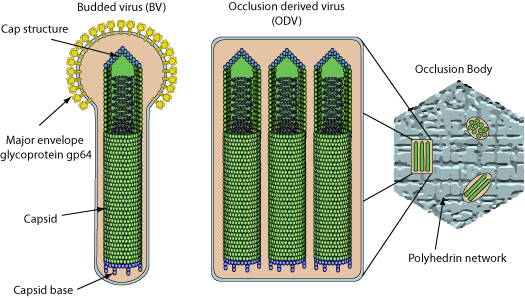Baculoviridae (taxid:10442)
VIRION

Envelopped. extracellular baculovirus virions can be found in two forms: OV (occluded virus) and BV (budded virus). The nucleocapsid is about 21 nm x 260 nm.
GENOME
Circular dsDNA, 80-180 kb in length, encoding for 100 to 180 proteins.
GENE EXPRESSION
ENZYMES
- DNA primase [LEF-1]
- DNA dependent DNA polymerase [POL]
- DNA dependent RNA polymerase [DdRp]
- Alkaline nuclease [AN]
- Cell-type capping
- Peptidase C1A [VCATH]
- Metallopreotease (Peptidase M60) [VEF]
- Serine/threonine-protein kinase [PK1]
- Tyrosine-protein phosphatase [PTP]
- Chitinase [P41684]
REPLICATION
NUCLEUS
- Attachement of the viral glycoproteins to host receptors mediates endocytosis of the virus into the host cell.
- Fusion with the plasma membrane.
- The DNA genome is released into the host nucleus.
- Immediate early phase: host RNA polymerase transcribes viral genes involved in the regulation of the replication cascade, prevention of host responses and viral DNA synthesis.
- Late phase: The virally encoded RNA polymerase expresses late genes.
- Replication of the genome by rolling circle in nuclear viral factories.
- Nucleocapsids are formed which can either bud out through the cellular membrane and disseminate the infection or be occluded for horizontal transmission.
- Occlusion phase: the virus becomes occluded in the protein polyhedrin and the polyhedral envelope (calyx) is produced. Lysis of the cell releases the occluded virus.
Host-virus interaction
Apoptosis modulation
Several viral proteins are dedicated to inhibit host apoptosis. Among them, IAP3 is a RING-finger E3 ubiquitin ligase that ubiquitinates and subsquently targets host pro-apoptotic factors. Baculovirus caspase inhibitors P49 and P35 block virus-induced apoptosis downstream of effector caspase DrICE activation.
Cell-cycle modulation
Some baculoviruses encode viral cyclins such as ODV-EC27 or BmNPV ORF120 that maintains the host cells at the G2/M phase while permitting the virus DNA replication  .
.
Matching UniProtKB/Swiss-Prot entries
(all links/actions below point to uniprot.org website)399 entries grouped by strain
155 entries
Autographa californica nuclear polyhedrosis virus (AcMNPV) reference strain
133 entries
Orgyia pseudotsugata multicapsid polyhedrosis virus (OpMNPV) reference strain
12 entries
Lymantria dispar multicapsid nuclear polyhedrosis virus (LdMNPV) reference strain
5 entries
Choristoneura fumiferana nuclear polyhedrosis virus (CfMNPV) reference strain
6 entries
Cryptophlebia leucotreta granulosis virus (ClGV) (Cryptophlebia leucotreta granulovirus) reference strain
4 entries
Cydia pomonella granulosis virus (isolate Mexico/1963) (CpGV) (Cydia pomonella granulovirus) reference strain
3 entries
Epiphyas postvittana nucleopolyhedrovirus (EppoMNPV) reference strain
3 entries
Rachiplusia ou multiple nucleopolyhedrovirus (strain R1) (RoMNPV) reference strain
2 entries
Adoxophyes honmai nucleopolyhedrovirus reference strain
2 entries
Choristoneura fumiferana defective polyhedrosis virus (Cfdef) reference strain
2 entries
Xestia c-nigrum granulosis virus (XnGV) (Xestia c-nigrum granulovirus) reference strain
1 entry
Choristoneura fumiferana granulovirus (CfGV) reference strain
1 entry
Orgyia pseudotsugata multicapsid polyhedrosis virus (OpMNPV)
9 entries
Lymantria dispar multicapsid nuclear polyhedrosis virus (LdMNPV)
14 entries
Bombyx mori nuclear polyhedrosis virus (BmNPV)
5 entries
Choristoneura fumiferana nuclear polyhedrosis virus (CfMNPV)
5 entries
Heliothis zea nuclear polyhedrosis virus (HzSNPV) (Helicoverpa zea single nucleocapsid nuclear polyhedrosis virus)
4 entries
Spodoptera exigua nuclear polyhedrosis virus (strain US) (SeMNPV)
3 entries
Hyphantria cunea nuclear polyhedrosis virus (HcNPV)
3 entries
Spodoptera littoralis nuclear polyhedrosis virus (SlNPV)
2 entries
Anticarsia gemmatalis nuclear polyhedrosis virus (AgMNPV)
2 entries
Buzura suppressaria nuclear polyhedrosis virus (BsNPV)
2 entries
Mamestra brassicae nuclear polyhedrosis virus (MbNPV)
2 entries
Mamestra configurata nucleopolyhedrovirus (MacoNPV)
2 entries
Spodoptera litura multicapsid nucleopolyhedrovirus (SpltMNPV)
2 entries
Trichoplusia ni granulosis virus (TnGV) (Trichoplusia ni granulovirus)
1 entry
Adoxophyes orana granulovirus (AoGV)
1 entry
Agrotis segetum granulosis virus (AsGV) (Agrotis segetum granulovirus)
1 entry
Agrotis segetum nuclear polyhedrosis virus (AsNPV)
1 entry
Antheraea pernyi nuclear polyhedrosis virus (ApNPV)
1 entry
Galleria mellonella nuclear polyhedrosis virus (GmNPV)
1 entry
Harrisina brillians granulovirus (HbGV)
1 entry
Heliothis armigera granulosis virus (HaGV) (Heliothis armigera granulovirus)
1 entry
Lacanobia oleracea granulosis virus (LoGV) (Lacanobia oleracea granulovirus)
1 entry
Leucania separata nucleopolyhedrovirus (LsNPV)
1 entry
Malacosoma neustria nuclear polyhedrosis virus (MnNPV)
1 entry
Orgyia pseudotsugata single capsid nuclear polyhedrosis virus (OpSNPV)
1 entry
Panolis flammea multiple nucleocapsid polyhedrosis virus (PfMNPV)
1 entry
Pieris brassicae granulosis virus (PbGV) (Pieris brassicae granulovirus)
1 entry
Pseudalatia unipuncta granulosis virus (PuGV) (Pseudalatia unipuncta granulovirus)
1 entry
